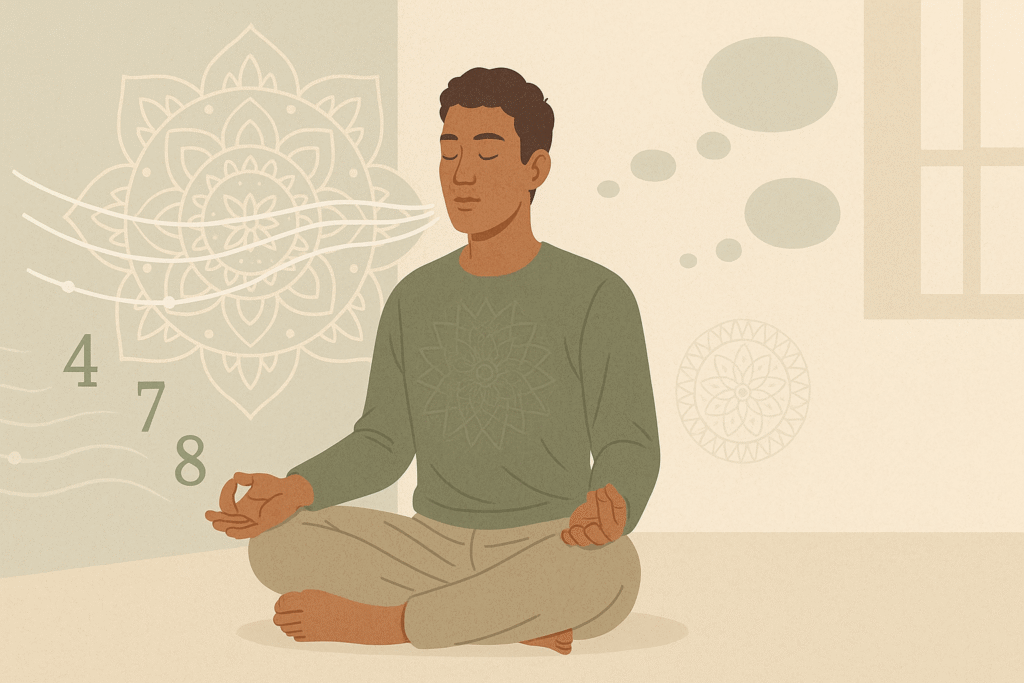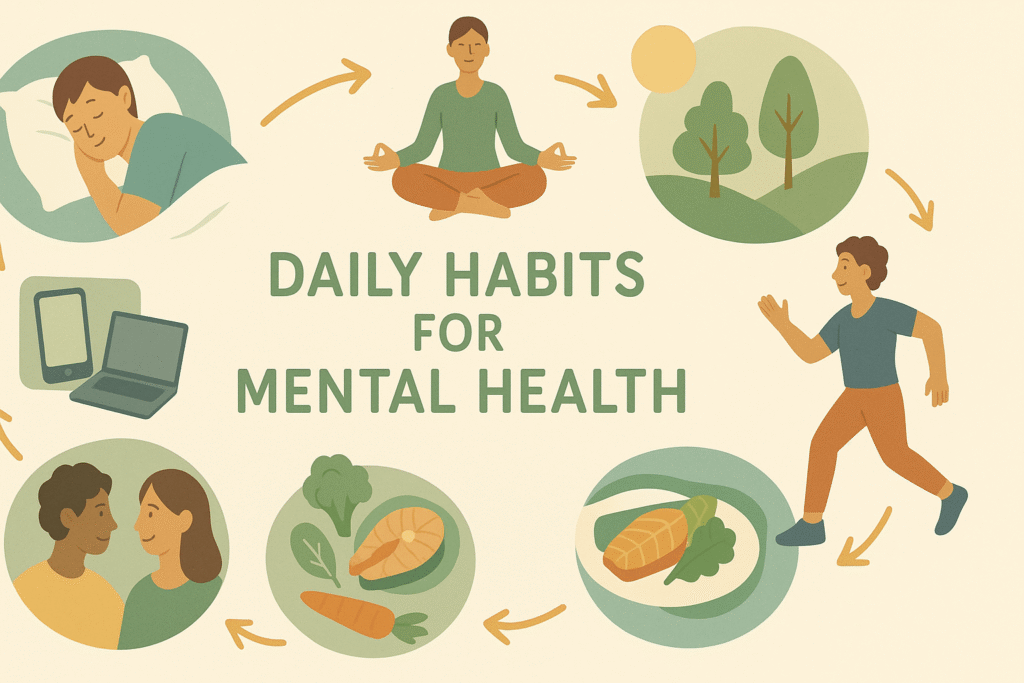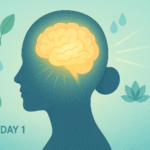Mental health isn’t just about managing crisis moments—it’s about building daily practices that strengthen your psychological resilience and emotional well-being. Research consistently shows that small, consistent habits can create profound changes in how we feel, think, and navigate life’s challenges.
In our fast-paced world, prioritizing mental wellness has become more crucial than ever. The good news? You don’t need dramatic lifestyle overhauls to see meaningful improvements. These eight evidence-based daily habits can help you boost your mental health, reduce stress, and build lasting emotional resilience.
1. Prioritize Quality Sleep for Mental Restoration

Sleep isn’t just physical rest—it’s when your brain processes emotions, consolidates memories, and resets for the next day. Poor sleep quality directly impacts mood regulation, stress management, and cognitive function.
How to Optimize Your Sleep for Mental Health
- Aim for 7-9 hours of consistent sleep each night
- Create a wind-down routine 30-60 minutes before bed
- Keep your bedroom cool, dark, and quiet
- Avoid screens 1 hour before bedtime to reduce blue light exposure
- Go to bed and wake up at the same time daily, even on weekends
Common Sleep Challenges and Solutions
If you struggle with racing thoughts at bedtime, try the “4-7-8” breathing technique: inhale for 4 counts, hold for 7, exhale for 8. This activates your parasympathetic nervous system, promoting relaxation.
For shift workers or those with irregular schedules, focus on creating consistent pre-sleep rituals that signal to your brain it’s time to rest, regardless of the actual time.
2. Practice Mindfulness and Meditation Daily
Mindfulness isn’t about emptying your mind—it’s about observing your thoughts and feelings without judgment. Regular mindfulness practice literally rewires your brain, strengthening areas associated with emotional regulation and reducing activity in the amygdala (your brain’s alarm system).
Getting Started with Mindfulness
- Begin with just 5 minutes daily using guided meditation apps
- Practice mindful breathing during routine activities like walking or eating
- Try body scan meditations to increase awareness of physical tension
- Use mindfulness anchors throughout the day—pause and take three conscious breaths
Advanced Mindfulness Techniques
Once comfortable with basic practices, explore loving-kindness meditation, which research shows can increase positive emotions and social connectedness. Progressive muscle relaxation can also help if you carry physical tension from stress.
3. Move Your Body in Ways You Enjoy

Exercise is one of the most powerful natural antidepressants available. Physical activity releases endorphins, reduces cortisol levels, and promotes neuroplasticity—your brain’s ability to form new neural connections.
Finding Your Movement Sweet Spot
- Choose activities you genuinely enjoy—dancing, hiking, swimming, or even vigorous cleaning
- Start with 20-30 minutes of moderate activity most days of the week
- Include both cardio and strength training for maximum mental health benefits
- Consider outdoor exercise for the added benefits of nature exposure
Overcoming Exercise Barriers
If traditional exercise feels overwhelming, start with “movement snacks”—5-minute walks, stretching breaks, or dancing to your favorite songs. The key is consistency over intensity.
For those dealing with depression or low energy, gentle yoga or tai chi can provide movement benefits while also incorporating mindfulness elements.
4. Connect with Nature Regularly
Nature exposure, even in small doses, can significantly reduce stress hormones, lower blood pressure, and improve mood. This phenomenon, known as “forest bathing” or shinrin-yoku in Japanese culture, has extensive scientific backing.
Ways to Incorporate Nature into Daily Life
- Spend at least 20-30 minutes outdoors daily, even if it’s just sitting in a park
- Bring nature indoors with plants, natural light, or nature sounds
- Practice “micro-nature” moments—notice birds, clouds, or trees during your commute
- Plan regular nature immersion experiences like hiking or beach visits
Urban Nature Solutions
City dwellers can benefit from rooftop gardens, urban parks, or even watching nature documentaries. Research shows that even viewing nature scenes can activate the parasympathetic nervous system.
5. Limit Screen Time and Practice Digital Wellness

Excessive screen time, particularly social media use, correlates with increased rates of anxiety, depression, and sleep disturbances. Digital wellness isn’t about complete avoidance—it’s about intentional, mindful technology use.
Creating Healthy Digital Boundaries
- Implement “phone-free” zones in bedrooms and during meals
- Use app timers to monitor and limit social media consumption
- Practice the “20-20-20 rule”—every 20 minutes, look at something 20 feet away for 20 seconds
- Curate your feeds to include positive, educational, or inspiring content
Workplace Digital Wellness
For those whose work requires extensive screen time, take regular breaks, use blue light filters, and practice eye exercises. Consider “batch processing” emails and notifications rather than responding immediately to every ping.
6. Nourish Your Body with Brain-Healthy Foods
The gut-brain connection is real—what you eat directly impacts your mood, energy levels, and cognitive function. A diet rich in omega-3 fatty acids, antioxidants, and complex carbohydrates supports optimal brain health.
Mental Health-Supporting Nutrition
- Include omega-3 rich foods like salmon, walnuts, and flaxseeds
- Eat plenty of colorful fruits and vegetables for antioxidants
- Choose complex carbohydrates like quinoa, oats, and sweet potatoes
- Stay adequately hydrated—even mild dehydration affects mood and concentration
- Limit processed foods, excessive caffeine, and alcohol
Meal Planning for Mental Wellness
Prepare brain-healthy snacks in advance: nuts and seeds, Greek yogurt with berries, or hummus with vegetables. Consistent blood sugar levels support stable moods throughout the day.
7. Cultivate Meaningful Social Connections

Humans are inherently social beings, and strong relationships are among the most significant predictors of mental health and longevity. Quality matters more than quantity when it comes to social connections.
Building and Maintaining Relationships
- Schedule regular check-ins with friends and family
- Practice active listening and genuine interest in others
- Join communities based on shared interests or values
- Volunteer to connect with others while contributing to meaningful causes
- Set healthy boundaries to protect your energy and well-being
Navigating Social Challenges
If social anxiety is a barrier, start small with low-pressure interactions like joining online communities or attending structured activities. Remember that building relationships takes time and consistency.
For introverts, focus on deeper connections with fewer people rather than trying to maintain large social networks.
8. Practice Gratitude and Positive Psychology
Gratitude isn’t just feel-good fluff—it’s a scientifically proven method for rewiring your brain toward positivity. Regular gratitude practice increases life satisfaction, improves relationships, and enhances overall mental resilience.
Effective Gratitude Practices
- Keep a daily gratitude journal—write down 3 specific things you’re grateful for
- Practice gratitude letters—write to someone who has positively impacted your life
- Use gratitude prompts during difficult times: “What’s one small thing going well right now?”
- Share appreciation with others regularly
Beyond Basic Gratitude
Explore “gratitude visits”—personally delivering gratitude letters to people who have helped you. Research shows this practice can boost happiness for months.
Consider gratitude meditation, where you focus on feelings of appreciation during mindfulness practice.
Addressing Mental Health Gaps: Special Considerations
Workplace Mental Health Strategies
- Take regular micro-breaks throughout the workday
- Practice desk-based mindfulness exercises
- Set realistic boundaries between work and personal time
- Communicate openly about mental health needs with supervisors when appropriate
Seasonal Mental Health Maintenance
- Use light therapy during darker months
- Maintain consistent routines despite seasonal changes
- Adjust exercise and nutrition to support seasonal needs
- Plan enjoyable activities during challenging seasons
Mental Health During Life Transitions
Major life changes—job loss, relationship changes, moving—require extra mental health support:
- Maintain familiar routines where possible
- Seek additional social support during transitions
- Practice self-compassion during adjustment periods
- Consider professional counseling for major transitions
When to Seek Professional Support
While these daily habits can significantly improve mental wellness, they’re not substitutes for professional mental health care. Consider reaching out to a mental health professional if you experience:
- Persistent feelings of sadness, anxiety, or hopelessness
- Significant changes in sleep, appetite, or energy levels
- Difficulty functioning in daily activities
- Thoughts of self-harm or suicide
- Substance use as a coping mechanism
Remember, seeking help is a sign of strength, not weakness.
Your Mental Health Action Plan
Building these habits doesn’t happen overnight. Start by choosing 2-3 habits that resonate most with you, and gradually incorporate others as these become routine. Consistency matters more than perfection.
Consider tracking your habits using a simple journal or app to monitor progress and identify patterns. Celebrate small wins—every step toward better mental health matters.
Mental wellness is an ongoing journey, not a destination. By incorporating these evidence-based daily habits, you’re investing in your long-term emotional resilience and overall quality of life.
Frequently Asked Questions
Q: How long does it take to see improvements in mental health from these habits?
A: Some benefits, like improved mood from exercise or better sleep quality, can be noticed within days to weeks. However, lasting changes in mental resilience typically develop over 2-3 months of consistent practice.
Q: What if I can’t maintain all 8 habits consistently?
A: Start with 2-3 habits that feel most manageable and gradually add others. It’s better to maintain a few habits consistently than to attempt all eight and become overwhelmed.
Q: Are these habits effective for clinical depression or anxiety?
A: While these habits can be beneficial supplements to professional treatment, they shouldn’t replace therapy or medication for clinical mental health conditions. Always consult with a healthcare provider for persistent mental health concerns.
Q: How do I stay motivated when I don’t see immediate results?
A: Focus on the process rather than outcomes. Track small daily wins, find an accountability partner, and remember that mental health improvements often happen gradually. Consider working with a therapist or coach for additional support.
Q: Can these habits help with work-related stress and burnout?
A: Absolutely. These habits are particularly effective for managing workplace stress. Pay special attention to sleep hygiene, digital boundaries, and stress-reduction techniques like mindfulness and exercise.
Ready to transform your mental health? Start today by choosing one habit that resonates with you, and take the first step toward a more resilient, balanced life.



